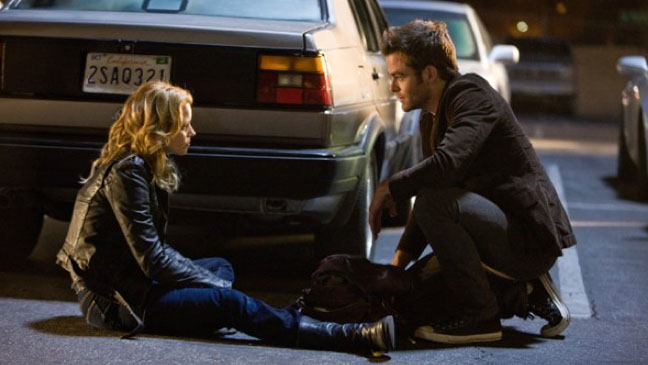Us and Them, by Tyler Smith
There is plenty to like in Alex Kurtzman’s People Like Us. The story is mildly interesting and all of the actors involved are clearly working hard to help us connect with these characters, often succeeding. But, in the end, it’s all in service of a movie that I mostly forgot about the moment it was over.
It’s not unlike an interesting or amusing anecdote that somebody tells you at a party. It holds your attention while you’re listening, but it’s not that engaging and, when it’s over, it’s not going to stick with you. But, then, perhaps it wasn’t meant to. Perhaps People Like Us and other movies like it aren’t meant to be particularly challenging; they’re perfectly pleasant affairs that are content to be forgotten. There’s nothing wrong with that, I suppose, but when one considers the cast and the material, I find myself wishing that the filmmaker had more of a desire to make a real impact on me.
As it is, the story, while specifically interesting, borrows a little too much from other movies. We get a self-absorbed businessman who, upon hearing about his father’s death, travels across the country to attend the funeral, only to discover that his family is more complicated than he thought. If this set-up reminds you of Rain Man, I certainly can’t blame you. Beat for predictable beat, our protagonist, Sam (played with refreshing commitment by Star Trek‘s Chris Pine) starts down a path that has been trod countless times before.
Once Sam starts to look into his father’s life, he discovers a second family. Sam’s father had affair with a woman thirty years before, producing a young daughter that he eventually abandoned. This daughter grows up to be Frankie, played by the ever-watchable Elizabeth Banks. Sam introduces himself to Frankie without ever revealing their relationship. As he gets closer to the sister he never knew he had, he also finds himself playing mentor to her 11-year-old son, Josh. Josh’s father is no longer in the picture and he needs a male role model to help give him direction. This is a situation that is not without potential, but, too often, the film chooses to have Sam give Josh lectures about the right and wrong kind of music. And, yes, if you’re hearing echoes of About A Boy, it’s understandable.
As more and more is revealed and old wounds are opened up, the film starts to become a little bit deeper. Pine and Banks are clearly willing to explore the darker and more vulnerable sides of characters so fiercely committed to self-preservation that any chink in the armor is both painful and frightening. When Sam finally comes clean with who he is and how he is connected to Frankie, Banks is allowed the opportunity to really display such complicated emotions as panic and embarrassment and betrayal, all at the same time. It is a difficult scene to watch, because it is so emotionally gut-wrenching. But this is as it should be, I think. When dealing with such uncomfortable issues as abandonment and forgiveness within a family, it should be messy.
One thing a story like this shouldn’t be is slight and affable. When we watch films like You Can Count On Me or Secrets & Lies, we see tenuous relationships pushed to the breaking point. These are real people experiencing a myriad of emotions interacting with each other, understanding that there is an expectation of love and acceptance in a family that they feel they just aren’t able to meet.
If Alex Kurtzman were more willing to stop trying to make a film that was so actively heartwarming and simply followed the characters down the rabbit hole of raw emotion, I think he would have found that the connection the audience would feel with these people would be much more genuine and heartfelt. He wouldn’t have to try so hard to convince us that we care about these people. We would actually care about them.
Unfortunately, People Like Us just isn’t the fulfilling film that it very well could have been. To be sure, there are many scenes and several performances that I found engaging, but these mostly served to highlight the other moments of falseness and general movieness of it all. So while I’m sure Kurtzman would have preferred we approach the title as the essence of relatability, thinking to ourselves that these characters are indeed people just like ourselves, ultimately the film keeps the audience at arm’s length.






























